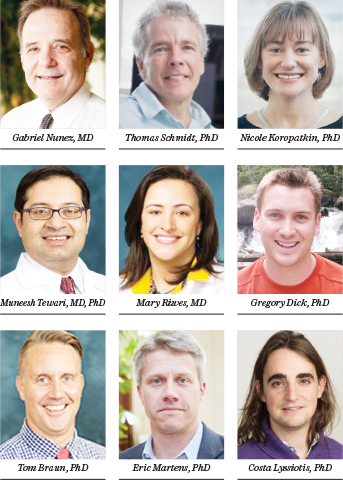A team of researchers from the University of Michigan Rogel Cancer Center in Ann Arbor received an $11.2 million grant from the National Heart, Lung, and Blood Institute to study how to use the microbiome to limit complications of stem cell transplants for blood cancers and other diseases.
Hematopoietic cell transplants using donor cells can be a life-saving treatment. However, graft-vs-host disease is a common and serious side effect that can limit its use. Researchers who have been exploring the role of microbiome and host-metabolism interactions in graft-vs-host disease have teamed up for this program project grant.

“Our overarching goal is to make allogeneic hematopoietic cell transplantation safer and more efficacious. The proposal has a unifying central theme to understand the role of intestinal microbial metabolite interactions with host metabolism and the impact on intestinal graft-vs-host disease,” said principal investigator Pavan Reddy, MD, Deputy Director of the Rogel Cancer Center and Division Chief of Hematology/Oncology at Michigan Medicine.
Four Components
The projects will address the importance of the microbiome in mitigating the severity of graft-vs-host disease and improving outcomes after allogeneic transplants.
Project 1, led by Dr. Reddy, will explore the crosstalk between host cells and the metabolite butyrate in mouse models of graft-vs-host disease.
Project 2, led by Gabriel Nunez, MD, will look at another host-microbiome interaction involving secondary bile acids.
Project 3, led by Thomas Schmidt, PhD, and Nicole Koropatkin, PhD, focuses on the critical microbes and mechanisms that break down resistant starch to generate butyrate and secondary bile acids.
Project 4, led by Muneesh Tewari, MD, PhD, and Mary Riwes, MD, will explore a proof-of-concept clinical trial looking at the role of dietary resistant starch on patients’ microbiome and metabolome and the impact on clinical graft-vs-host disease.
The proposal is supported by four core services, which are led by Gregory Dick, PhD; Tom Braun, PhD; Eric Martens, PhD; and Costa Lyssiotis, PhD. The collaboration represents multiple schools across the University of Michigan, including the Medical School; the School of Public Health; and the College of Literature, Science, and the Arts.
“This project brings together a team of investigators from diverse fields and schools, who have worked and published together previously. These collective projects are the results of unifying our preliminary data sets over the past several years. We hope that by working collaboratively, we can make a difference for patients receiving hematopoietic cell transplants,” Dr. Reddy said.

